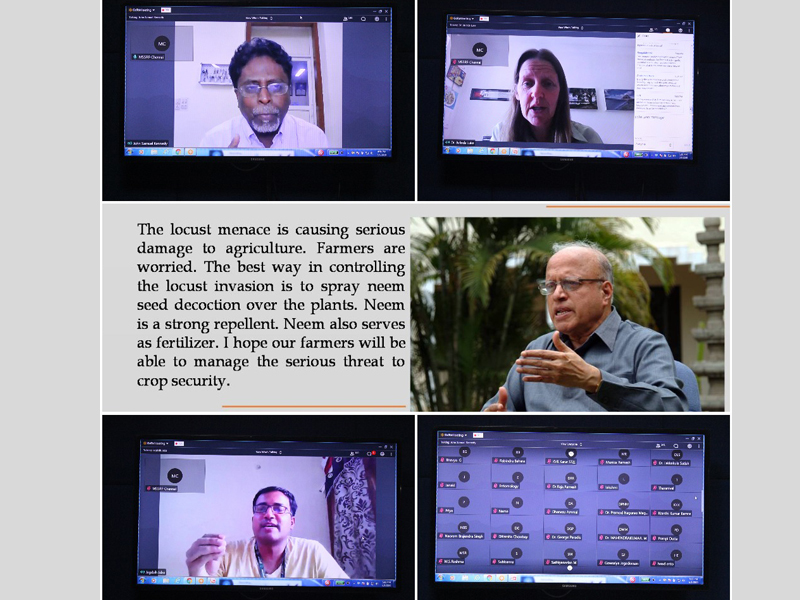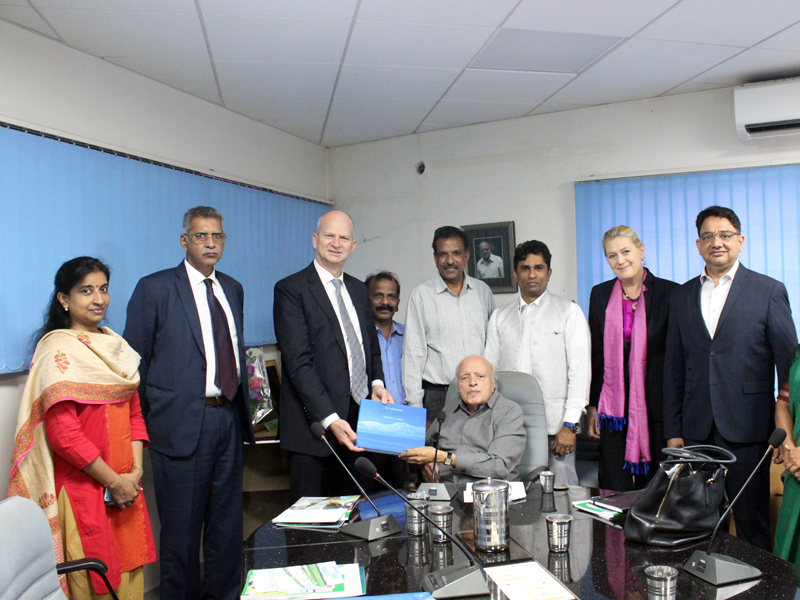The communication and outreach activities of the Foundation are carried out through multiple efforts, including online interaction, physical events and seminars, besides facilitating visibility through news media and knowledge sharing through library services. During 2019–20, a new communication strategy was drawn up with a series of comprehensive initiatives. The objective was to connect research and scientific developments to society, besides engaging on key concerns related to the work of the Foundation. During 2019–20, the cumulative outreach was over three million reads, views and interactions through multiple media channels. In addition, support was provided for various projects to facilitate project objectives and enhance outreach and information dissemination. During the year, the writing of articles by scientists was facilitated and capacity built for popular writing. New internal and external sharing mechanisms were initiated and important days commemorated with special events and promotional activities.
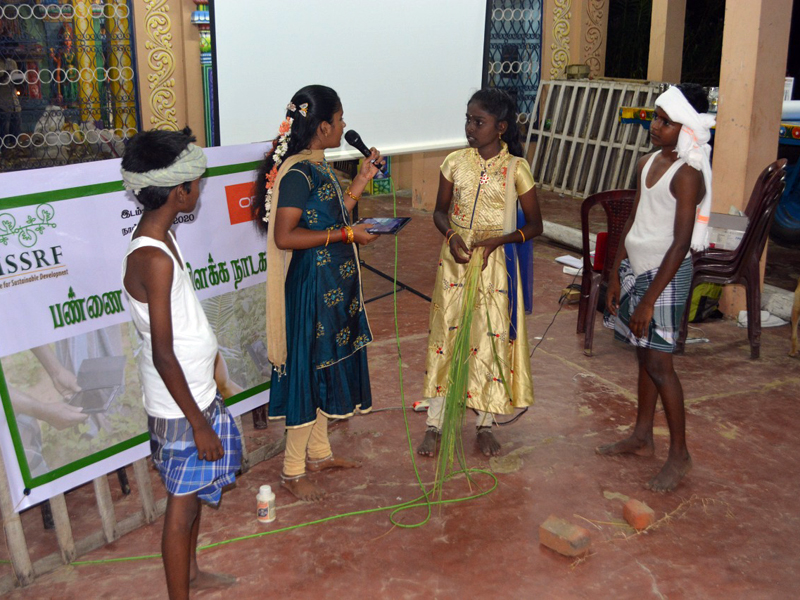
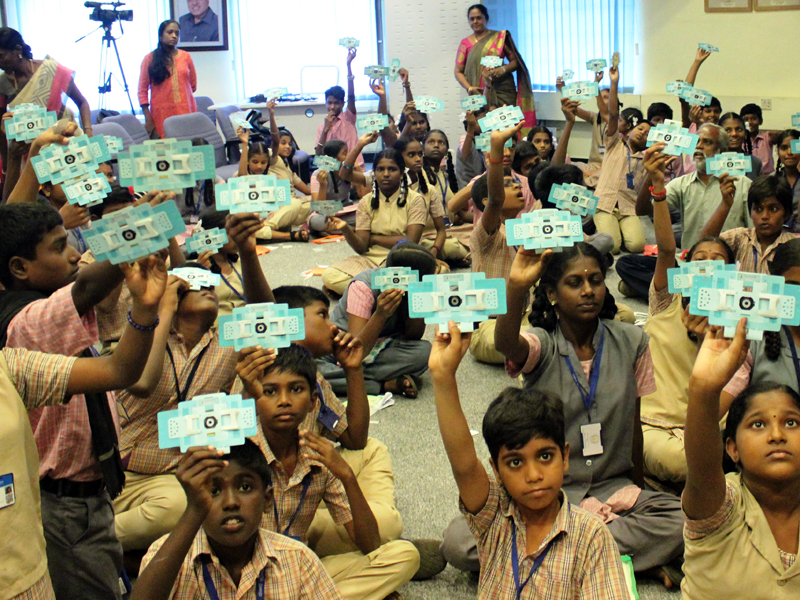
Library and Information Services
The Bhoothalingam Library at MSSRF is well-organized and plays an important role in fulfilling the needs of scientists of the Foundation as well as researchers and students from other research and educational institutions. It has 18845 books, of which 60 were added during the year. It also holds a collection of CDs, journals, including 4585 bound journals, with 21 added during the year. Moreover, the library has a collection of technical reports and annual reports from various institutions. Current Awareness Services (CAS), Selective Dissemination of Information (SDI), Document Delivery, Publication and Distribution Services and Reprographic Services are offered by the library. It continued assistance through the Centre for Agriculture and Bioscience International (CABI) for full-text research articles to students; around 90 students from national and international universities benefited from this. Access to electronic databases of India Stat, JSTOR and SAGE has been made available. The lifetime work of Prof. M. S. Swaminathan has been digitized, and efforts are on to create an updated archival system.
Online Outreach
The website had an average of about 22000 page-views serving as a contact point for enquiries from media, students, development practitioners, farmers, academicians, international agencies and members of the public. In addition to news clippings, social media updates and publications, a total of 52 new articles were posted on the website during the year. MSSRF’s monthly e-newsletter, e-Synergy, went out to over 2000 internal and external stakeholders, including media persons and scientific, academic and student communities. The MSSRF twitter handle (@mssrf) disseminated information about the Foundation’s research work and other general information to the public. The number of followers as of May 2020 was around 4900. Total impressions were about 548100 or an average of around 45675 reads every month on Twitter, with new followers. Prof. M. S. Swaminathan’s Twitter handle (@msswaminathan) had 2361000 impressions. Over 5515 new followers were added during the year, taking the number of his followers to 39315 as of March 31. On Facebook, the Foundation had a reach of over 164562 people, with regular posts, campaigns and event updates shared throughout the year. A total of 6421 people ‘liked’ the MSSRF Facebook page regularly. During the year, a page was also created on LinkedIn and regular posting initiated. The YouTube channel of the Foundation has been sharing live videos of events as well as event-based videos. An internal sharing mechanism ‘Facebook workplace’ was initiated for the staff and two orientation programmes provided on its use. MSSRF staff members are now using this for internal information sharing about ongoing activities. An Instagram profile has also been added, and it shares regular photographs from the work of the Foundation from various field sites.
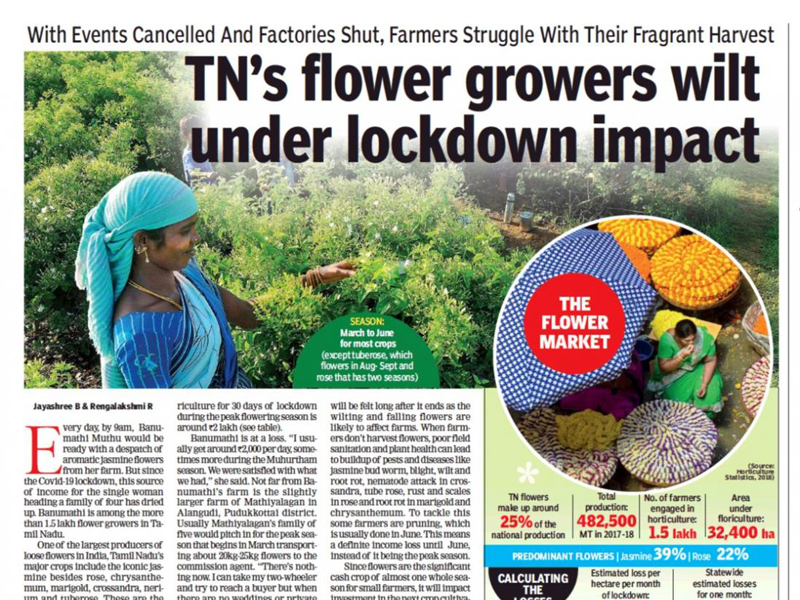
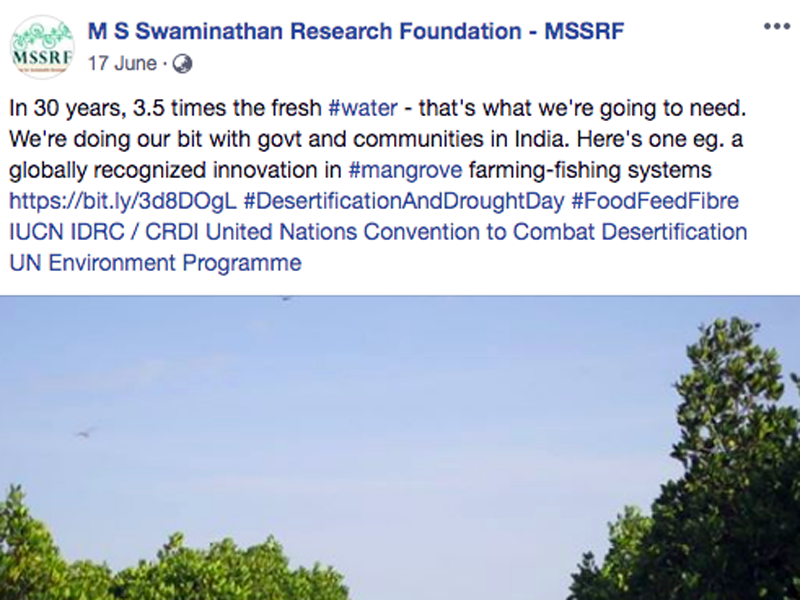
The HinduMedia Resource Centre
The Hindu Media Resource Centre (THMRC) shares information and facilitates regular interaction with media through press releases, stories and media capacity building and also helps address queries to provide inputs on scientific and research/development stories. During the year, more than 288 new stories in newspapers, web editions and television channels featured MSSRF. These stories were covered in many languages, including English, Tamil, Telugu, Odia, Hindi and Malayalam. More than 35 press releases were issued to journalists for events, seminars, updates and statements on behalf of the Foundation. Interviews and media coverage were facilitated for various events, besides e-mailers, invites and logistics for organizing the events. Regular media tracking and documenting is being done with special compilations for major initiatives. Popular media writing by scientists was also facilitated during the year with over 10 articles authored by staff being published. Global media outreach was also made possible with high-impact mainstream popular media articles An active visitor outreach for students and practitioners from educational and research institutions was encouraged with an average of 500 visitors every month to the Chennai headquarters.
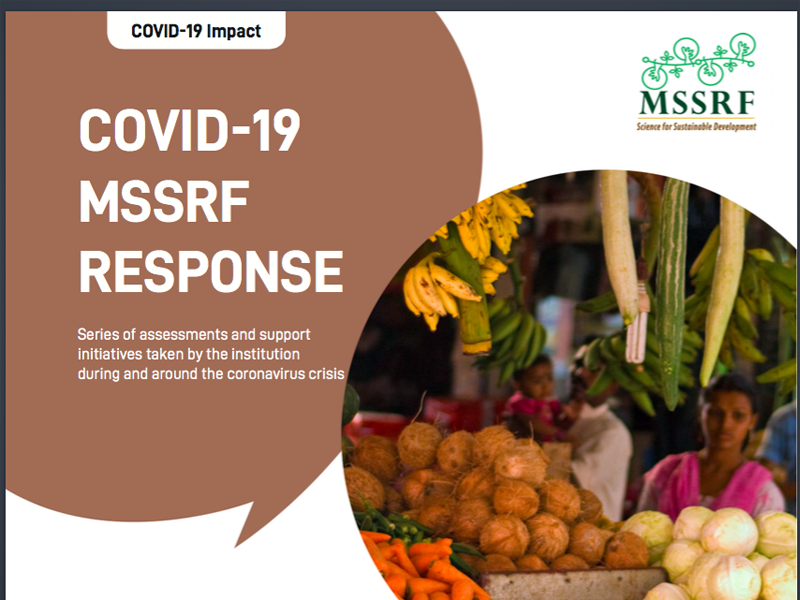
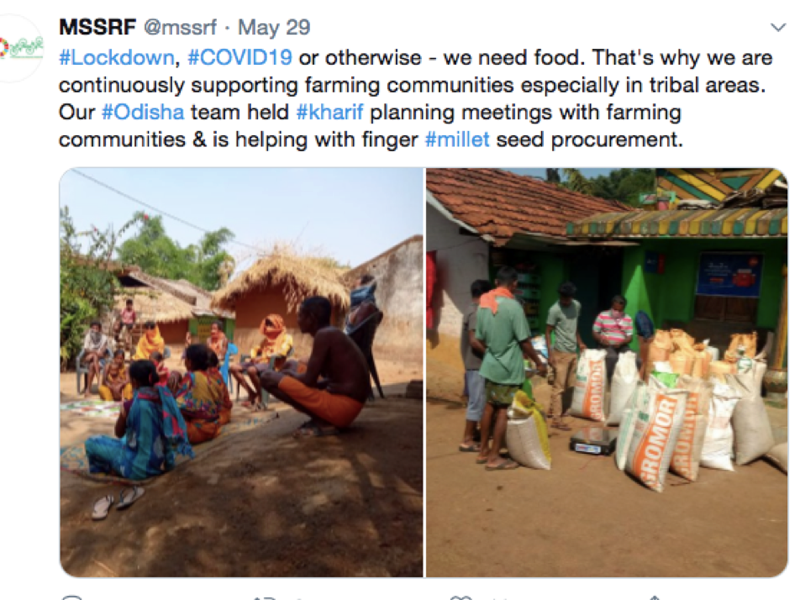
MSSRF 30th Foundation Day
The year marked the completion of 30 years of the Foundation, and an international conference was organized coinciding with the Foundation Day in August. A special website for MSSRF-30 was created with specially curated content. Also, support was provided for a series of publications brought out to commemorate the 30th Foundation Day of MSSRF besides an updated brochure. Co-ordination and support were provided for an MSSRF-30-year video film that was created for the occasion. Prof. Swaminathan’s interaction with world leaders was documented as an interactive web tool. Media interaction and outreach were facilitated as well. A special event documentation of the MSSRF-30 conference was completed in print, audio/video and presentations compiled and circulated to key stakeholders. A new organization profile document was also created for external outreach.
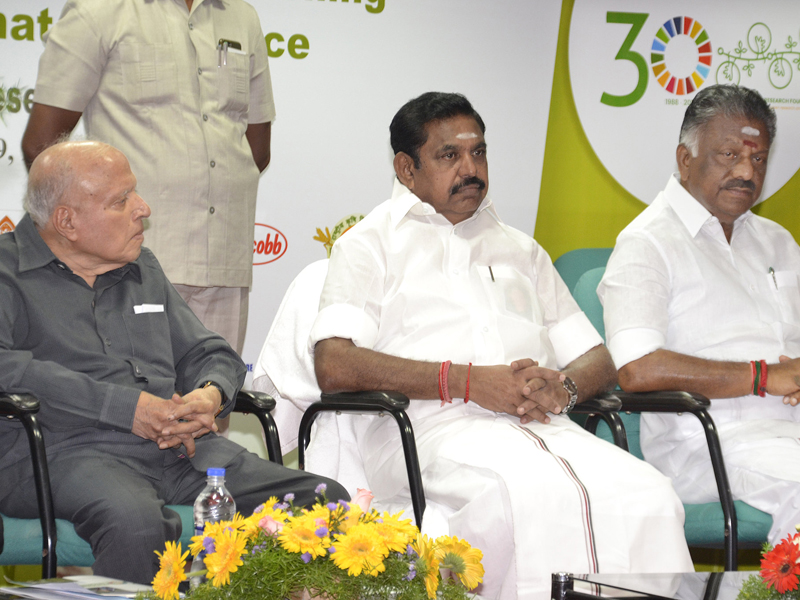
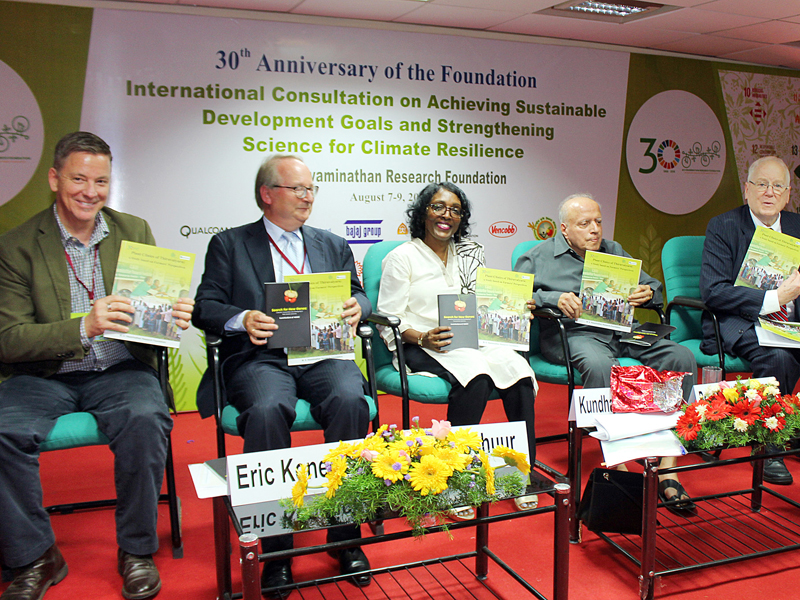
Lectures and Seminars
Public outreach support was provided through seminars and events across thematic areas. Seminars organized included subjects ranging from seed and biodiversity to nutrition and traditional agriculture. Over 15 seminars were organized during the year with researchers, students and stakeholders from different institutions participating. These seminars were also live-streamed for the benefit of a wider audience. As part of special events, the first Gopalan Memorial Lecture, featuring Dr Soumya Swaminathan, tool place in January 2020, while a special series of agenda-setting talks with Nature Research publishing was held in March 2020. A day-long event on ‘Every Child a Scientist’ commemorating International Children’s Day was held in November 2019 to build scientific temper among children from schools of the Chennai city corporation. Another special event was held on World Food Day on the theme of ‘Healthy Diets for a #ZeroHunger World’.
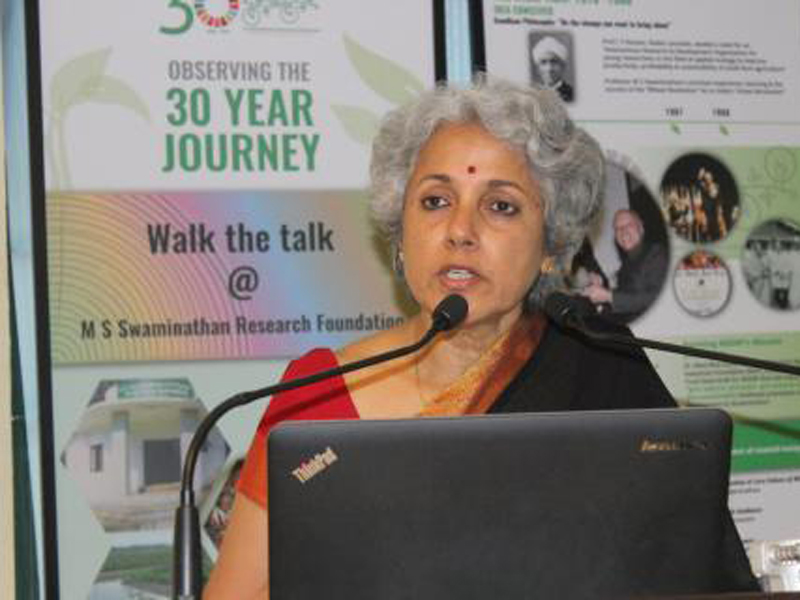
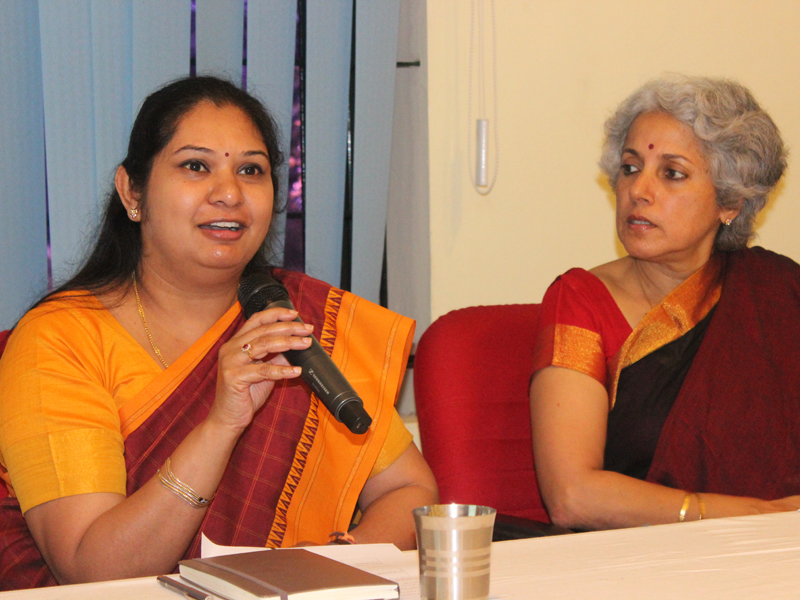
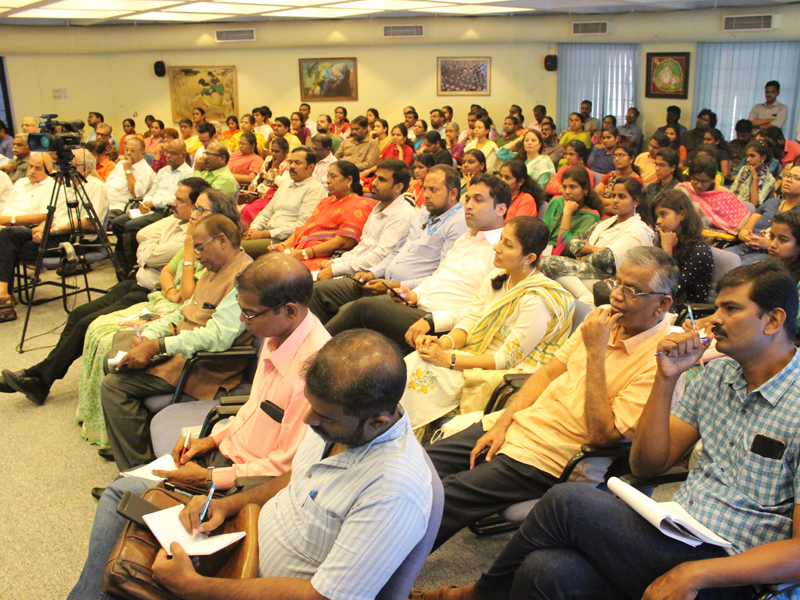
Project Support
Communication support was provided to various projects to enhance the impact for reaching out to communities and other stakeholders. The designing and development of strategic communication approaches helped support projects. A series of promotional activities was held to support the uptake of community usage for the Charities Aid Foundation – Geographical Information System (CAF-GIS) project. The Fish for All Centre completed 10 years, for which communication and outreach support was provided. Eight programs for two community radio stations were created as part of the Bay of Bengal project and trainings facilitated for media persons through two workshops. Communication support for the ‘Nutrition-Secure Puducherry’ initiative was provided as also communication planning and support for Resilience, Transforming India’s Green Revolution by Research and Empowerment for Sustainable Food Supplies (TIGR2ESS) and Water Security and Climate Adaptation in Rural India (WASCA) projects for a series of emerging upcoming activities. The design and development of a series of policy briefs related to Covid-19 and the subsequent lockdown were facilitated. These were also promoted among key external stakeholders.
Seminars and Key Events
Through the year, MSSRF organized various seminars and events providing a platform for vibrant engagement on science, research, development among scientists, relevant stakeholders as well as members of the public. Some of the key events that were organized included the August Annual Conference and Foundation Day celebrations. Also, important days such as the ‘World Food Day’ and ‘International Children’s Day’, besides the first Gopalan Memorial Lecture, were marked with events at the headquarters, and days such as Soil Day and ‘Coastal Cleanup Day’ were commemorated by regional centers. Other highlights were the launch of the ‘Nutrition-Secure Puducherry’ initiative and an event on 150 years of science with ‘Nature’ research. A brief report on some of the key events follows:
- MSSRF Annual Conference 2019 – From 30 Years to 2030: The Annual Conference 2019 – marked the 30th Foundation Day celebration of MSSRF. Held from 7 to 9 August, it brought together a range of high-profile speakers and various stakeholders in science, development and policy. A major objective of this event was to take stock of changes in sustainable agriculture and rural development over the past three decades, in particular in food, nutrition and livelihoods, as a result of multisectoral interventions. The event helped plan future strategic research, development and deployment of scientifically credible knowledge and evidence in the challenging areas of sustainable development. The discussions focused on three thematic areas: climate change and coastal India; sustainable livelihood, nutrition and health security; and biodiversity mainstreaming for sustainable agriculture and climate resilience.
Primary outputs from this meeting included:
- Consolidated results of evidence-based studies and interventions to achieve sustainable agricultural and rural development goals in different locations of India, particularly the coastal, semi-arid, and dryland ecosystems and the biodiversity and cultural diversity hotspots of the country; gaps to be addressed were identified.
- Development of partnerships and networks between policymakers, community institutions, media, NGOs, private-sector institutions, scientists and donors, working in the areas of sustainable livelihoods, natural resource management, and food, nutrition, and health security, to upscale the achievements and take the results to desirable new heights.
- Discussion of resource mobilization mechanisms and strategies for strengthening initiatives at the community-scientist-policymaker level to promote conservation, enhancement and sustainable and equitable use of agrobiodiversity and other natural resources for achieving the SDGs. The conference proceedings, video and presentations can be accessed here: https://www.mssrf.org/mssrfthirtyyearsnew/
- The ‘Nutrition-Secure Puducherry’ initiative was launched by Mr V. Narayanasamy, Chief Minister of Puducherry, at the Pillayarkuppam ‘Biovillage’ amid a gathering of over 300 women from various collectives, to commemorate the 150th Gandhi Jayanti. In his video message, Prof. M. S. Swaminathan emphasized the five aspects of nutrition: calorie deficiency, protein malnutrition, micronutrient deficiency, water and sanitation and nutrition awareness to achieve ‘nutrition security’. Dr Anil Kumar, Executive Director, MSSRF; Ms Kathanayagi, InnuyirGramaSangam; Dr Balagandhi, Director, Department of Agriculture and Animal Welfare; Dr N. Vijayakumar from KVK, Puducherry; and Dr G. N. Hariharan, MSSRF, spoke on the occasion. Women’s group members, farming communities, government department officials and scientists from MSSRF attended the event, which was well covered by the media.
- Universal Children’s Day was celebrated at Chennai in November 2019. Children from Chennai’s corporation schools (one zone) gathered to express their thoughts on climate change and share expectations from science and scientists. Foldscopes, donated to the institution by Prof. Bruce Alberts, former Editor-in-Chief of ‘Science’ and President of the National Academy of Sciences, United States, were distributed to the students through the ‘Every Child a Scientist’ initiative of MSSRF. Prof. Swaminathan emphasized the need for children to contextualize and know about climate change. The demonstration in Chennai was conducted by Mr Mo Pandiarajan, an expert who has been training children in the use of this equipment. Children gave suggestions on using solar energy, protecting trees and growing flowering plants, and pollinator bees and also shared interesting artworks, expressing thoughts on climate change.
- The launch of the Bharatiya Poshan Krishi Kosh (BPKK; the India Agriculture Nutrition Fund) highlighting the importance of agriculture for nutrition was held in the presence of Ms Smriti Irani, Minister for Women and Child Development, government of India, and Mr Bill Gates, Microsoft founder. In his keynote message on video, Prof. M. S. Swaminathan spoke of the importance of ending malnutrition, especially among mothers and children. He suggested that the government set up a band of ‘community hunger fighters’ to address malnutrition at the community level besides his five-point plan to address malnutrition.
- PANNAI app launch: Mr R. B. Udhayakumar and Mr R. Doraikannu, Ministers of Tamil Nadu, launched the PANNAI (Pest-disease Advance Notification and Need-Based Agriculture Information) app and geo-agri portal developed by MSSRF with the support of Oracle CSR and technical inputs from Tamil Nadu Agriculture University (TNAU) on 5 November. This provides advance information on pest-diseases so farmers can protect their crops, also using integrated information from the Uzhavan app of Tamil Nadu. Mr Udhayakumar, Minister for Revenue and Disaster Management and Information Technology; Mr Doraikannu, Minister for Agriculture; Prof. M. S. Swaminathan; Dr Anil Kumar; Mr Ramesh Venkatachari, representative from Oracle; Mr R. Nagarajan, MSSRF Head of Project; and Mr Balasubramanian, a farmer, also spoke on the occasion.
- Gopalan Memorial Lecture: As a mark of honour to the memory of the ‘Father of Nutrition Research in India’, the Dr C. Gopalan Memorial Lecture was announced by Prof. M. S. Swaminathan at the condolence meeting for Dr Gopalan at MSSRF in October 2019. The first Dr C. Gopalan Memorial Lecture was held in January 2020 at MSSRF, Chennai, and featured Dr Soumya Swaminathan, Chief Scientist, WHO, and former DG, ICMR. In her talk, she focused on the ‘double burden of malnutrition’ or ‘the new nutrition reality’, namely, the co-existence of obesity along with stunting, that had to be addressed urgently.
- 150 years of Science through ‘Nature’: Nature, the international journal of science, turned 150 in November 2019. As part of the global celebrations, the Nature Research Group, along with MSSRF, marked the historic occasion with an event themed ‘150 Years of Science through the Pages of Nature’. The half-day event on 6 March 2020 at MSSRF, Chennai, featured six short, agenda-setting talks by leading scientists, innovators and science policy experts of India.
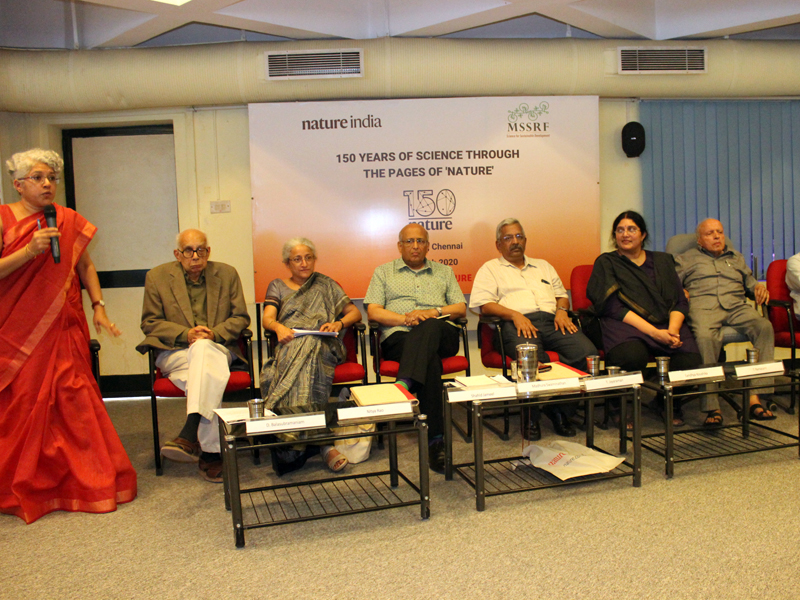
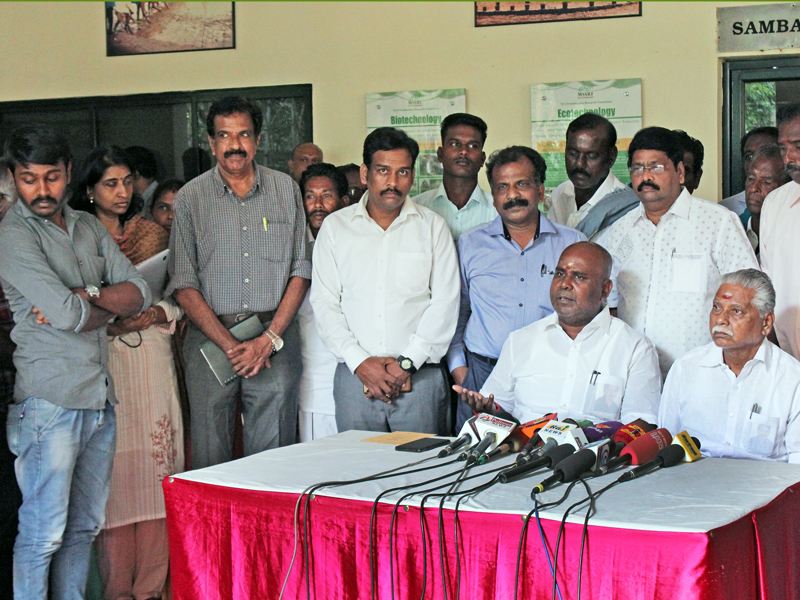
- Padma Awardees event: Two inspirational personalities, with several achievements despite disabilities, were felicitated at a special event in March 2020. Mr Manohar Devadoss and Mr S Ramakrishnan, both Padma Shri awardees, were felicitated by Mr N. Ram, Chairman, Kasturi and Sons, speaking at MSSRF, Chennai. Prof. Swaminathan spoke of the importance of celebrating humanity. ‘The value system that you stand for is the value system we need in the country; where people will put the country above themselves and look at values applied to human well-being.’
- A webinar on locusts: MSSRF hosted a webinar on locusts in partnership with CABI titled ‘Locust Attacks: What India’s Farming Community Needs to Know’. The discussion was organized because of concerns due to unexpected locust swarms across western and northern parts of India. To provide scientific information, the online discussion took place with Dr Belinda Luke, Senior Insect Pathologist and Team Leader Biopesticides, CAB International; Dr Jaba Jagdish, Scientist and Head Entomology, International Crops Research Institute for the Semi-Arid Tropics (ICRISAT); and Dr J. S. Kennedy, Dean, School of Post-Graduate Studies, Tamil Nadu Agricultural University. The event had video presentations that were disseminated widely to the public.
- Webinar in partnership with Monash University: The dangers of increasing inequalities, poverty and food insecurity and the need for urgent and enhanced relief packages were highlighted by Dr Madhura Swaminathan, Chairperson, MSSRF, at a webinar in June. Titled ‘COVID19: Addressing Food Security and Nutrition’, jointly hosted by Monash Business School’s Centre for Development Economics and Sustainability (CDES), the School of International and Public Affairs at Columbia University and MSSRF, the panel included eminent speakers Dr David Dawe, Senior Economist with the Food and Agriculture Organisation (FAO), United Nations; and Dr Marie T. Ruel, Director of the Poverty, Health and Nutrition Division, International Food Policy Research Institute (IFPRI).
- Reboot Tamil Nadu webinar presence on Times of India platform: In an online event organized by the Times of India media house, Mr Gagandeep Singh Bedi, Principal Secretary Agriculture, Tamil Nadu; Mr Ravichandran Purushothaman; and Dr R. V. Bhavani, MSSRF Director for Agriculture-Nutrition-Health, participated along with Mr Jayaraj Sivan, Times of India. Dr Bhavani emphasized the agriculture-nutrition link and building better nutrition and immunity and how the community could better cope with pandemics. The event was well received online with a high viewership.
- Seminar on Auroville: A seminar was delivered by Mr Joss Brooks on Auroville, on the transition from dust and drylands to forests. A restoration ecologist, Mr Brooks highlighted success stories of helping rejuvenate land and how it could solve the problems of Chennai. Prof. M. S. Swaminathan, Founder, MSSRF, applauded the unique approach of Auroville, saying it should be declared a ‘University for Peace with Nature’.
- Seminar on Transforming Food Systems: Prof. Prabhu Pingali, an eminent economist, delivered a seminar at MSSRF in December 2019 on the book Transforming Food Systems for a Rising India written by him and co-authored by Drs Anaka Aiyar, Mathew Abraham and Andaleeb Rahman. The book explores challenges and opportunities to achieve a nutrition-secure future through production systems, improved health and hygiene environment and greater capability to access a balanced diet. Co-author Dr Anaka Aiyar, health economist, spoke on the need to refocus public policy to increase system and nutrition diversity and tackle the triple burden of malnutrition.
